#école polytechnique
Text
in light of that asshole being arrested, and the fact that he praised the École Polytechnique shooter, I want to talk about that shooting because so many of us weren't born or were too young to remember
on 6 December 1989, a man walked into a Montréal university, École Polytechnique, and massacred 14 women
he separated the men from the women, yelled << Vous êtes toutes des feministes! >> or "You're all feminists!" and opened fire on the women
the names of the women who were killed were Geneviève Bergeron, Hélène Colgan, Nathalie Croteau, Barbara Daigneault, Anne-Marie Edward, Maud Haviernick, Barbara Klucznik-Widajewicz, Maryse Laganière, Maryse Leclair, Anne-Marie Lemay, Sonia Pelletier, Michèle Richard, Annie St-Arneault, and Annie Turcotte
the shooter claimed to have been fighting feminism, and thought women should not be allowed to study engineering.
my mother was an engineering student nearby, so I can tell you for a fact that this had an impact on women's studies outside of the school. several of my mom's classmates dropped out after the shooting.
the recent news of a man supporting what is sometimes known as the Montréal Massacre is horrifying. but it isn't unexpected. this is where anti-feminist and misogynistic ideology leads, and the modern version of those ideologies retain the same violent hatred that the École Polytechnique shooter had.
I will not name the shooter, he deserves no such naming. he died, but his ideology lives on and can still be deadly.
sources: 1 and 2
#mine#cdnpoli#canada#canadian#canadian news#canadian politics#école polytechnique#misogyny#violence against women#gender based violence#misogyny tw#violence#violence tw#gender based violence tw#violence against women tw
57 notes
·
View notes
Text
Today at 5:10 p.m., the moment when, 34 years ago, the first shots were fired at École Polytechnique, 14 beams will illuminate the Montreal sky.
The beams, representing the 14 women killed at the Montreal engineering school, will shine atop Mount Royal at the Belvedere Kondiaronk. A ceremony will be held inside the Mount Royal chalet.
6 notes
·
View notes
Text

#École Polytechnique massacre#école Polytechnique#34 years#canadian history#women's history#they will never be forgotten
5 notes
·
View notes
Text
Geneviève Bergeron
Hélène Colgan
Nathalie Croteau
Barbara Daigneault
Anne-Marie Edward
Maud Haviernick
Maryse Laganière
Maryse Leclair
Anne-Marie Lemay
Sonia Pelletier
Michèle Richard
Annie St-Arneault
Annie Turcotte
Barbara Klucznik-Widajewicz
4 notes
·
View notes
Text
every year, i forgot the école polytechnique massacre and halifax explosion have the same anniversary date, and then every year i am over here like

1 note
·
View note
Text
Staatliche Regulierung kann die Gefahren sozialer Medien wirksam eindämmen
Neue Forschungsergebnisse zeigen, dass staatliche Gesetze zur Kennzeichnung und Moderation gefährlicher Inhalte in sozialen Medien wirksam zur Schadensminderung beitragen können, selbst auf schnelllebigen Plattformen wie X (ehemals Twitter).
Social-Media-Beiträge, die Terrorismus und Hass fördern, gefährliche Herausforderungen darstellen, die das Leben von Teenagern gefährden, oder solche, die…

View On WordPress
#École polytechnique fédérale de Lausanne#Elon Musk#Facebook#Halbwertszeit#Infektionskrankheit#Instagram#LinkedIn#Twitter#University of Technology#Sydney#YouTube
0 notes
Text
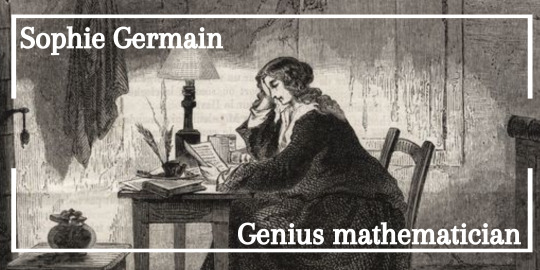
Mathematician, physician and philosopher (1776-1831), Sophie Germain was a genius who fought hard to be heard a recognized.
A self-taught prodigy
The daughter of a silk merchant, Sophie was born in Paris to a relatively wealthy family. When the French Revolution broke out in 1789, her father became a member of the Constituent Assembly. Amidst the chaos, Sophie found solace in her father's library and discovered mathematics.
Fascinated by the subject, she learned everything she could, studying at night. Her parents disapproved. Mathematics was thought to be too complex for women who had to focus first and foremost on their home.
Sophie's parents tried to stop her by putting out the fire in her room at night and confiscating her clothes and candles after nightfall. Sophie's thirst for knowledge was stronger. According to her obituary, she studied “at night in a room so cold that the ink often froze in its well, working enveloped with covers by the light of a lamp”. She even taught herself Latin to read the essential works.
Sophie impresses
The École Polytechnique was founded in 1974 with to train a new elite of engineers, mathematicians and scientists. Being a woman, Sophie couldn’t attend. She learned that a student named Leblanc wasn’t able to go to class. She wrote to the school, pretending to be him, and managed to obtain lecture notes. She was also able to complete and submit assignments.
This promising student impressed mathematician Joseph-Louis Lagrange who found her answers brilliant. The self-taught Sophie had gained the admiration of one of the most renowned mathematicians of her time.
Lagrange's desire to meet her forced Sophie to reveal her real identity. Lagrange was at first surprised to learn that his correspondent was a woman. He nonetheless became Sophie’s mentor, introducing her to a new world and opportunities.
Sophie made major contributions to number theory. She worked on Fermat's last theorem, making major observations and creating her own theorem. This would be one of her major contributions to mathematics.
In 1804, she began a correspondence with another mathematician, Carl Friedrich Gauss, whose work she admired. He was similarly impressed by her intelligence:
“But how to describe to you my admiration and astonishment at seeing my esteemed correspondent Monsieur Leblanc metamorphose himself into this illustrious personage who gives such a brilliant example of what I would find it difficult to believe. A taste for the abstract sciences in general and above all the mysteries of numbers is excessively rare: one is not astonished at it: the enchanting charms of this sublime science reveal only to those who have the courage to go deeply into it. But when a person of the sex which, according to our customs and prejudices, must encounter infinitely more difficulties than men to familiarize herself with these thorny researches, succeeds nevertheless in surmounting these obstacles and penetrating the most obscure parts of them, then without doubt she must have the noblest courage, quite extraordinary talents and superior genius.”
An incomplete recognition
Sophie was also interested in physics. In 1811, she entered a contest held by the French Academy of Sciences, but her lack of formal education turned against her. She didn't give up and won the contest in 1816 with her Memoir on the vibrations of Elastic Plates. She kept working on the theory of elasticity and published several more memoirs. Her work would prove pivotal in the field.
This prize also meant official recognition for Sophie. In 1823, she became the first woman to be allowed at the Academy of Sciences' sessions. Though respected as an equal collaborator by some, she still felt like a “foreigner” in the scientific community.
Sophie Germain died at the age of 55, on June 27, 1831, after a battle with breast cancer. Carl Friedrich Gauss had convinced the university of the University of Gottingen to give her an honorary degree but Sophie was dead before she could receive it.
Her death certificate designated her as a "rentière-annuitant" (a single woman with no profession) instead of a mathematician.
Today, a street in Paris, schools in France and a crater on Venus are named in her honor. She appeared on a French postal stamp released in 2016.
Feel free to check out my Ko-Fi if you like what I do! Your support would be greatly appreciated.

Further reading
Alkalay-Houlihan Coleen, “Sophie Germain and special cases of Fermat’s last theorem”
Boyé Anne,, “Sophie Germain, une mathématicienne face aux préjugés de son temps”
“Biographies of women mathematicians : Sophie Germain”
Lamboley Gilbert, “Math’s hidden woman”
Koppe Martin, “Sophie Germain, une pionnière enfin reconnue”
#sophie germain#history#historyedit#women in history#19th century#france#french history#upthebaguette#herstory#mathematics#mathematicians#historical#historical figures#women in stem#european history#historyblr
60 notes
·
View notes
Text



Oliver: The Polytechnique ball thinks big!
Napoléon V: I suggested the Garnier Opera to the school president. You've got to have a bit of fun!
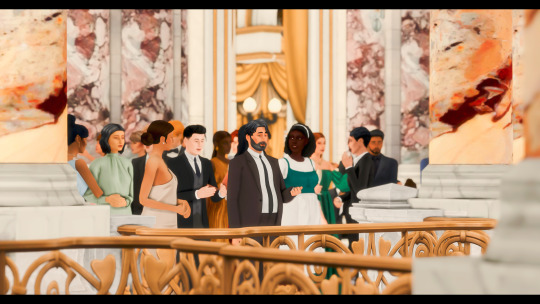

Oliver: How did your honeymoon go?
Napoléon V: Very well, thank you. It was strange to be cut off from the world, away from all the hustle and bustle of Paris.



Oliver: Good! You needed a rest. By the way, I thought it would please Hortense to have an estate in Francesim, so that we could visit you from time to time.
Napoléon V: That's a good idea, I like knowing that my twin sister won't be too far away from us.

Oliver: Of course, don't worry, I'll look after her… That is, if you agree, officially
Napoléon V: Officially, so that's it?
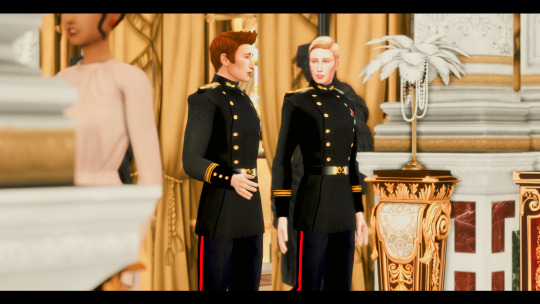
Oliver: Yes, I've been ready for several months now. I'm sorry again for all the trouble I've caused you, it wasn't…
Napoléon V: Let's not talk about it any more. It's all settled. I know that Hortense will be happy with you, surely … more than with me.

Oliver: You were born to take different paths. At this time in your lives, the distance is natural. However, I believe I can echo Hortense's sentiments that she loves you dearly, no matter what and despite everything that has happened.
Napoléon V: Thank you, Oliver. I'm counting on you to look after her.

⚜ Le Cabinet Noir | Paris, 17 Messidor An 230
Beginning ▬ Previous ▬ Next
Napoléon V and his entourage went to the Grand Bal de l'X, organised by the École Polytechnique to celebrate the end of their year of study. The ball took place at the Opéra Garnier, and featured a number of performances including dances, fencing, a choir and many other distinguished ceremonies. It's a not-to-be-missed event for young students. During the evening, Oliver approached his friend Napoléon V to officially ask for his sister Hortense's hand in marriage. The Emperor agreed to make the engagement official.
(Thanks to @theroyalthornoliachronicles and @funkyllama for the sims deco and accessories! Oliver is a character belonging to @officalroyalsofpierreland)
⚜ Traduction française
Napoléon V et ses proches se rendent au grand bal de l'X, organisé par l'école Polytechnique pour fêter la fin d'année d'étude. Le bal se déroule à l'opéra Garnier, et donne lieu à de nombreux spectacles comme des danses, des combats d'escrimes, une chorale, et bien d'autres cérémonies distinguées. C'est le rendez-vous immanquable des jeunes étudiants. Durant la soirée, Oliver approche son ami Napoléon V pour lui demander officiellement la main d'Hortense, sa soeur. L'Empereur accepte d'officialiser les fiançailles.
Oliver : Le bal de Polytechnique voit les choses en grand !
Napoléon V : J’ai proposé l’opéra Garnier au président de l’école. Il faut bien s’amuser un peu !
Oliver : Et ta lune de miel alors, ça s’est bien passé ?
Napoléon V : Très bien, merci. C’était étrange d’être coupés du monde, loin de toute l’agitation parisienne.
Oliver : Tant mieux! Tu avais besoin de repos. À propos, j’ai pensé que cela ferait plaisir à Hortense d’avoir un domaine en Francesim, pour que l’on puisse vous rendre visite de temps en temps.
Napoléon V : C’est une bonne idée, j’aime savoir que ma jumelle ne sera pas trop éloignée de nous.
Oliver : Bien sûr, ne t’en fais pas, je prendrai soin d’elle… Enfin, si tu y consens, officiellement
Napoléon V : Officiellement, alors ça y est ?
Oliver : Oui, cela fait plusieurs mois que je suis prêt. Encore désolé pour tous les ennuis que j’ai pu t’attirer, ce n’était pas…
Napoléon V : N’en parlons plus. C’est réglé. Je sais que Hortense sera heureuse avec toi, sûrement … plus qu’avec moi
Oliver : Vous êtes nés pour prendre des chemins différents. À ce moment de votre vie, la distance est naturelle, mais je crois pouvoir me faire l'écho des sentiments d'Hortense qui t'aime tendrement, quoi qu'il arrive et en dépit de tout ce qui s'est passé.
Napoléon V : Merci Oliver. Je compte sur toi, pour veiller sur elle.
#simparte#ts4#ts4 royal#royal simblr#sims 4 royal#sim : louis#sims 4 fr#sims 4#ts4 royalty#sim : oliver#opéra garnier#le cabinet noir#polytechnique#bal#sims 4 royal story#sims 4 royal family#sims 4 royal simblr#sims 4 royalty#ts4 royals#ts4 royal family#ts4 royal simblr
70 notes
·
View notes
Photo
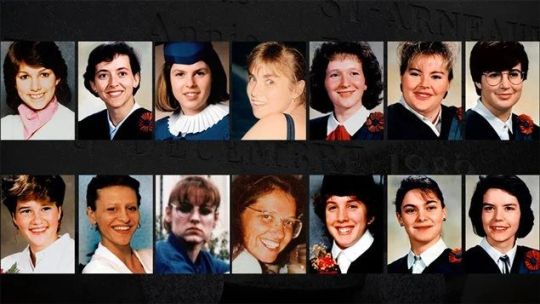
On this day, 6 December 1989 (content note: gendered violence), 14 women, most of whom were training in engineering fields, were murdered in a mass shooting at the École Polytechnique in Montreal. The 25 year old shooter specifically targeted women, claimed he was "fighting feminism," and killed himself after shooting 28 people. The names of those lost were: Geneviève Bergeron, Hélène Colgan, Nathalie Croteau, Barbara Daigneault, Anne-Marie Edward, Maud Haviernick, Maryse Laganière, Maryse Leclair, Anne-Marie Lemay, Sonia Pelletier, Michèle Richard, Annie St-Arneault, Annie Turcotte, and Barbara Klucznik-Widajewicz. The day is commemorated annually across Canada as the National Day of Remembrance and Action on Violence Against Women. https://www.facebook.com/workingclasshistory/photos/a.1819457841572691/2153570694828069/?type=3
413 notes
·
View notes
Text
One of [Brissot’s] son was placed at the École Polytechnique. By then the imperial scepter weighed on France, and one seemed to have forgotten the martyrs of liberty. All the pupils were solemnly convoked to individually take an oath of fidelity to the emperor. The president called the boys one by one. When the turn of the young Brissot came and the president asked: ”You swear fidelity to the emperor?” the young man answered with a firm voice, ”No!” The president, as you may well imagine, was absolutely taken back by this brusque declaration, and the whole company was stupefied with astonishment. Finally they ventured to ask Brissot what was the reason for his refusal. ”I am too young,” he answered, ”to pass judgment on political matters; what I know is that my father died on the scaffold for the Republic, and I am a republican.” It is difficult to say what the countenance of the presiding dignitary was; but I was assured that the whole school, transported by one of those sudden movements which so easily penetrate young hearts, crowded around the culprit, lavished upon him a thousand assurances of attachment, and followed him as a body when he withdrew. The next day he did not wait for his resignation, he offered it himself. I received all these details from the mother of Madame Brissot, Madame Dupont, who told me about them the day after they happened.
Souvernirs de la Révolution française (1827) by Helen Maria Williams, page 23—24
#frev#french revolution#brissot#helen maria williams#what i know about revolutionaries children so far:#horace desmoulins - cutest#scipion hébert - the one i feel most bad for#whichever of brissot’s three sons this happens to be - most badass#edit: it’s sylvain brissot#the middle child#they do say those do anything to get attention huh?
26 notes
·
View notes
Text
"Anti-feminist blogger Jean-Claude Rochefort, who was convicted of fomenting hatred against women, has been sentenced to 12 months in jail.
The 74-year-old had been arrested in December 2019 in connection with posts and doctored images he had posted to his blog, in which he praised Marc Lépine, who murdered 14 women at Montreal's École Polytechnique on Dec. 6, 1989 in an anti-feminist attack.
Charged in 2010 for making death threats against women on his website, Rochefort was writing under a pseudonym. Montreal police's cyber investigation team nevertheless managed to find him and charge him again in December 2019.
He was found guilty of wilfully promoting hatred against women last August.
In his ruling, Quebec Superior Court Justice Pierre Labrie rejected Rochefort's claims that his publications constituted satire, exaggeration or self-deprecation.
Noting the use of the word kill and the use of images of firearms and decapitated women in the accused's posts, the judge found that Rochefort could not have been unaware that he was deliberately promoting hatred against women."
Full article
Tagging: @politicsofcanada
#cdnpoli#canada#canadian politics#canadian news#canadian#jean-claude rochefort#misogyny#sexism#violence#violence against women#misogyny tw#sexism tw#violence tw#violence against women tw#montréal#québec#montreal#quebec
137 notes
·
View notes
Text

Never forget their names.
Never forget what happened to them.
Not in order of their photos.
Genevieve Bergeron
Helene Colgan
Nathalie Croteau
Barbara Daigneault
Anne-Marie Edward
Maud Haviernick, Barbara
Klucznik-Widajewicz
Maryse Laganiere
Maryse Leclair
Anne-Marie Lemay
Sonia Pelletier
Michele Richard
Annie St-Arneault
Annie Turcotte.
The École Polytechnique massacre
12 notes
·
View notes
Text
Tumour Tracked
Tracking emergent colon tumours in real-time at the single-cell level over several weeks in a 3D lab-grown organoid system
Read the published research article here
Video from work by L. Francisco Lorenzo-Martín and Tania Hübscher, and colleagues
Laboratory of Stem Cell Bioengineering, Institute of Bioengineering, School of Life Sciences and School of Engineering, École Polytechnique Fédérale de Lausanne (EPFL), Lausanne, Switzerland
Video originally published with a Creative Commons Attribution 4.0 International (CC BY 4.0)
Published in Nature, April 2024
You can also follow BPoD on Instagram, Twitter and Facebook
7 notes
·
View notes
Text

Unlocking the magnetic superpowers of topological magnons
In the ever-evolving landscape of condensed matter physics, a recent breakthrough has emerged from the collaborative efforts of researchers at the Peter Grünberg Institute (PGI-1), École Polytechnique Fédérale de Lausanne, Paul Scherrer Institut in Switzerland, and the Jülich Centre for Neutron Science (JCNS).
This synergetic work, driven by the trio Manuel dos Santos Dias, Nikolaos Biniskos, and Flaviano dos Santos and led by Stefan Blügel, Thomas Brückel, and Samir Lounis, has delved into unexplored magnonic properties within Mn5Ge3, a three-dimensional ferromagnetic material.
Topology, a concept pivotal in contemporary physics, has already played a transformative role in understanding electrons in solids. From quantum Hall effects to topological insulators, the influence of topology is far-reaching. In this context, the focus has shifted to magnons—collective precession of magnetic moments—as potential carriers of topological effects. Magnons, being bosons, can exhibit unique phenomena akin to their fermionic counterparts.
Read more.
18 notes
·
View notes
Text
A Canadian college invited a trans-identified male to speak on violence against women in observation of the 33rd anniversary of an act of mass femicide.
Fae Johnstone, a trans-identified male, gave a keynote address today at Durham College in North Oshawa, Ontario as part of the school’s National Day of Remembrance Ceremony marking the anniversary of a massacre that left 14 women dead.
Johnstone, who describes himself as “trans feminine and non-binary,” is the Executive Director at Wisdom2Action, an LGBT-focused consulting firm. Johnstone’s website lists him as a “public speaker, consultant, educator and community organizer on unceded, unsurrended Algonquin territory.”
On Twitter, Johnstone announced his speech was part of the school’s “16 Days of Activism” to end “GBV [gender-based violence].”

The event Johnstone spoke at today is described on the Durham College website as commemorating the National Day of Remembrance and Action on Violence against Women in Canada.
The Day was first inaugurated by Parliament in 1991 as a way to honor the lives lost during the École Polytechnique massacre, which took place on December 6, 1989 in Montreal, Quebec. On the campus of the scientific university, a man identifying as an “anti-feminist” targeted female students for slaughter.
Prior to shooting all of the women in a mechanical engineering class, Marc Lépine, born Gamil Rodrigue Liass Gharbi, told the male students to leave the room. He then told the women he was “fighting feminism” and expressed a hatred of women’s rights to an education.
“You’re women, you’re going to be engineers. You’re all a bunch of feminists. I hate feminists,” Lépine said, before opening fire on the female students. Lépine later committed suicide on the campus after taking 14 women’s lives, and injuring 10 more people.
In total, Lépine murdered 14 women in an act that has since been recognized an act of terrorism.

After his speech at Durham College tonight, Johnstone was confronted by Jennifer Anne, a Canadian women’s rights advocate who has been working to secure the release of the analysis that was done on gender self-identification legislation in Canada.
Anne attended the event and recorded some of Johnstone’s address before proposing a question when given the opportunity by the event’s host.
“Today is the day we mark 14 women who were killed in Montreal by a man who subjected them simply because they were female. It is sex-based violence, not gender based violence. I am a female,” Anne is heard saying, before listing off examples where self-identification lead to the victimization of women.
“I am wondering why, on this day, we would have a man dressed in women’s garb to talk to us about sex-based violence and keeping women safe? How can women stay safe in this environment?”
Johnstone replies curtly: “Thank you. Next question!”
“Really? So you’re not going to answer it because you know I’m right?” Anne responds. The host of the event, as well as other administrators, are then heard trying to discourage Anne from continuing to assert her question.
Anne uploaded the recordings to her Twitter account.
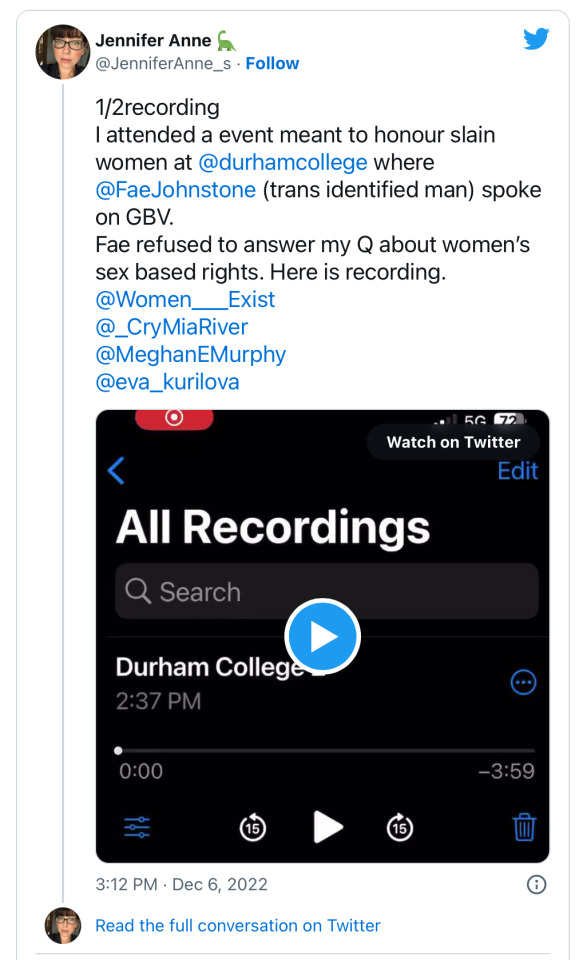
Johnstone’s consulting firm, Wisdom2Action, marked the anniversary of the women’s deaths by posting an infographic titled “Queering GBV,” which asserted that “gender based violence disproportionately impacts 2SLGBTQ+ people who are BIPOC, transfeminine, bisexual, youth, newcomers, disabled, homeless, and/or involved in sex work.”
For Canadian Women’s History Month in October, Johnstone was “honored” by a Government ministry for his work with “2SLGBTQI+” people.

Johnstone had previously slammed the Canadian Femicide Observatory for “retweeting TERF and TERF rhetoric.” TERF is a derogatory term most frequently applied to women who acknowledge two distinct sex groups.
He also claimed the Declaration on Women’s Sex Based Rights was a “roadmap for erasing trans people from public life, denying our rights and restricting our healthcare.”
Johnstone is not the first trans-identified male be given a platform to speak on the National Day of Remembrance and Action on Violence against Women.
Last year on December 6, the Prince Edward Island Advisory Council on the Status of Women invited Anastasia Preston, a biological male who identifies as a woman, to speak on “gender-based violence” at a vigil honoring the women murdered in the École Polytechnique massacre.
Preston, a “trans community outreach coordinator” at a sexually transmitted disease resource service, became the subject of widespread outrage on social media after he was interviewed by the Prince Edward Island branch of the CBC and claimed that trans-identified males were not given enough opportunities to speak on violence against women.
“For decades, trans women have been kept out of the conversation around gender-based violence,” Preston was quoted as saying, going on to assert that he intended to “speak about some of [his] experiences of harassment on P.E.I.” at the event memorializing the 14 women who were murdered.
After the article began to circulate, CBC P.E.I was so inundated with backlash they had to turn off their Twitter comment section. Johnstone defended Preston at the time, calling him a “hero and a champion.”
By Jennifer Seiland Jennifer is a founding member of the Reduxx team, writing with a focus on crimes against women and sex-based rights advocacy. She is located in the American south where she is a passionate animal welfare advocate and avid coffee drinker.
#Canada#Montreal massacre#december 6#Durham College#North Oshawa#Ontario#National Day of Remembrance Ceremony#Fae Johnstone is a man#Wisdom2Action#École Polytechnique massacre#14 women killed by male violence#Jennifer Anne is a heroine#Queering sex based violence is just men making any issue about themselves#Canadian Femicide Observatory
9 notes
·
View notes
Note
When the reader first encounters the Arcadie commanders’ uniform, it’s described in the following manner: “His uniform catches your attention; different than yours, midnight blue with bright red trim and golden buttons.”
I recently stumbled on Sadi Carnot’s Wikipedia page, which features the following profile picture and caption: https://ibb.co/QvdRDYy
Is the uniform worn by Arcadie’s commanders modeled after the École Polytechnique student uniform?
No, though most of my reference pictures are indeed of French officers from the late 1700s and early 1800s.
44 notes
·
View notes